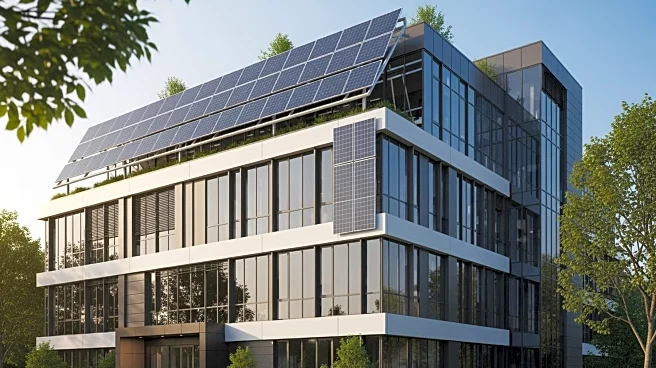What's Happening?
Recent developments in office building conversions highlight a growing emphasis on sustainability, particularly in the context of heating, hot water, and cooling systems. Building No.8 at Exchange Quay
in Manchester serves as a prime example, where the landlord replaced gas heating with air source heat pumps, significantly improving the building's EPC rating from D to B. This move aligns with the increasing demand for certifications such as BREEAM and NABERS, which prioritize low-carbon systems. The shift towards sustainable practices in non-domestic buildings, including offices, education, health, and warehouses, is driven by the need to reduce on-site fossil fuel use and future-proof buildings against changing energy pricing.
Why It's Important?
The focus on sustainability in office building conversions is crucial for reducing carbon emissions and enhancing energy efficiency. As tenants in retail, warehousing, and office markets increasingly seek buildings with sustainability certifications, property owners are incentivized to adopt low-carbon technologies. This trend not only contributes to environmental goals but also impacts the long-term value of buildings. By transitioning to modern heat pump technology, building owners can mitigate the risks associated with fossil fuel systems, such as higher gas prices and devalued properties. The move towards sustainable building practices is essential for achieving broader decarbonization targets and ensuring economic resilience.
What's Next?
The adoption of heat pumps in non-domestic buildings is expected to gain momentum, supported by government incentives and growing awareness of sustainability benefits. As more buildings transition to low-carbon systems, the focus will likely expand to include comprehensive energy efficiency strategies. Building owners may explore additional measures such as improved insulation and advanced glazing to further enhance performance. The shift towards sustainable practices is anticipated to drive innovation in building technologies and foster collaboration between industry stakeholders to achieve net-zero carbon goals.
Beyond the Headlines
The transition to sustainable building practices raises ethical considerations regarding the responsibility of property owners to contribute to environmental goals. It also highlights the cultural shift towards valuing sustainability in real estate, influencing tenant preferences and market dynamics. As the demand for sustainable buildings grows, there may be increased pressure on regulatory bodies to establish clear guidelines and standards for building conversions. This development could lead to long-term shifts in the real estate industry, prioritizing sustainability as a key factor in property valuation and investment decisions.










